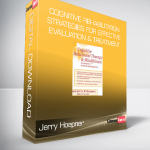Jerry Hoepner – Cognitive Rehabilitation Strategies for Effective Evaluation & Treatment
Original price was: $109.00.$32.00Current price is: $32.00.
Develop increased sensory awareness of your interconnectedness to nature and plants. Practice body-based meditation to feel your biological unity beyond a conceptual level. Study the four levels of using herbs in Tibetan and Ayurvedic medicine, from medical to spiritual.
- Description
- Reviews (0)
Description
Jerry Hoepner – Cognitive Rehabilitation Strategies for Effective Evaluation & Treatment
Cognitive-Linguistic Assessments
-
Screening tools
-
Cognitive evaluations (standardized and non-standardized)
-
Language assessments (standardized and non-standardized as they apply to cognitive assessments)
-
Rating scales (provider and consumer)
Cognitive Rehabilitation Techniques
-
Remediation / Compensation / Adaptation
-
Therapy decision-making (dynamic/ongoing assessment; patient centered; goal directed)
Documentation of Skilled Services
-
Justification for skilled, necessary and reasonable therapy
-
ICD-9 / ICD-10 codes pertinent to SLP intervention
-
SMART goals
-
Outcome measures
-
FIMS
-
NOMS
-
Relevancy to G-Codes
-
A guide for developing LTG’s
-
-
-
Key elements required for:
-
Daily notes
-
Progress notes
-
Attention
-
Posner’s Theory of Attention
-
Anatomic substrates of the attention system
-
Attention subtypes
-
Functional manifestations of inattention
-
Interventions strategies for promoting improved attention across recovery continuum
-
Remediation
-
Wakefulness (stimulation management programs)
-
Reduced agitation (validation therapy, environmental modification, positive psychology)
-
Increased function (direct attention training with reflection)
-
-
Compensatory strategies (partner-based supports, environmental interventions)
-
Adaptation techniques (assisted prompting)
-
-
Goal writing for attention deficits
Memory
-
Anatomy of the memory systems
-
Memory types
-
Encoding / Consolidation / Retrieval
-
Interventions for facilitating recall
-
Remediation
-
Utilization of preserved systems (spaced retrieval, routines, implicit learning)
-
Adaptation techniques
-
-
External aids
-
Task-specific learning
-
Goal writing for attention deficits
-
Executive Functions (EF)
-
Anatomic substrates of the EF system
-
McCloskey’s Executive Functions
-
Executive functioning hierarchy
-
Self-activation
-
Self-regulation
-
Self-realization
-
Self-determination
-
-
Functional manifestations of EF impairments
-
Specific focus areas for EF’s
-
Functional problem solving
-
Awareness / Insight
-
-
Strategies for reducing the effects of executive dysfunction
-
Remediation (Reflection, video self-modeling, Ylvisaker’s Goal-Plan-Do-Review)
-
Compensation (routines, environmental interventions, partner-based interventions)
-
Adaptation (cognitive prosthetics)
-
-
Goal writing for EF and problem solving
- Get Jerry Hoepner – Cognitive Rehabilitation Strategies for Effective Evaluation & Treatment download
Visual Perceptual Function
-
Anatomy of the visual system
-
Warren’s Visual Perceptual Hierarchy
-
Functional manifestation of visual perception deficits
-
Therapeutic strategies specific to:
-
Low vision
-
Hemispatial neglect
-
Remediation (known quantities, metacognitive/self-regulatory interventions)
-
Compensation (environmental interventions, partner-based interventions, edgeness and bookness)
-
Adaptation (visual/attentional prosthetics)
-
-
Goal writing for visual perceptual impairments
Special Considerations
-
Delirium
-
DSM-5® criteria for delirium
-
The neuroscience of delirium
-
Diagnosing delirium
-
Protective, predisposing and precipitating factors for delirium
-
Reversible causes for delirium
-
Treatment techniques for delirium
-
-
Depression
-
Clinical manifestations of geriatric depression
-
Medications which can cause depression
-
SLP role in the management of depression
-
-
Right Hemisphere Dysfunction (RHD)
-
Assessment tools specific to RHD
-
Clinical manifestations of RHD
-
Left hemispatial neglect
-
Pragmatic impairment
-
Reduced awareness / insight
-
Cognitive impairment
-
-
Specific Therapy Activities
Case Studies
Description:
The rehabilitation of cognitive impairments is becoming more and more complicated. Patients in your care are presenting with complex, multi-faceted cognitive deficits, and at best you have 48 minutes, five days per week to understand and improve upon their cognition. Keeping up with the ever-changing evidence on assessment and interventions for acquired cognitive disorders can feel daunting. Your previous learning in graduate training programs may already be obsolete. Furthermore, you are now better equipped to apply knowledge to the clinical context. We will revisit applications of anatomy and physiology to everyday practice, affirm relevance of current-effective clinical practices, and adapt new practices supported by contemporary evidence. Join Jerry Hoepner, PhD, CCC-SLP, and gain a clear understanding of the functional manifestations of cognitive impairments, organize cognition into a manageable paradigm, and establish functional goals to guide your effective therapy.
- Cognitive-Linguistic Assessment Tools
- Documentation for Reimbursement
- Attention
- Memory
- Executive Function Skills
- Visual Perceptual Function
- Delirium, Depression and Right Hemisphere Dysfunction
Drawing on over 15 years of clinical experience and more than 10 years of teaching, Dr. Hoepner will teach you skills to appropriately create a plan of care and realistically facilitate improved function in your patients. Attend this information-packed seminar and systematically understand the anatomy of each component of the cognitive-communication system and move quickly into specific management techniques for intervention. Walk away with practical and useful techniques which can be implemented immediately within your practice. Through examples from experience and case studies, Dr. Hoepner will go beyond lecturing and facilitate learning through a collaborative exchange of ideas relating to therapy techniques.
Get Jerry Hoepner – Cognitive Rehabilitation Strategies for Effective Evaluation & Treatment download





Reviews
There are no reviews yet.